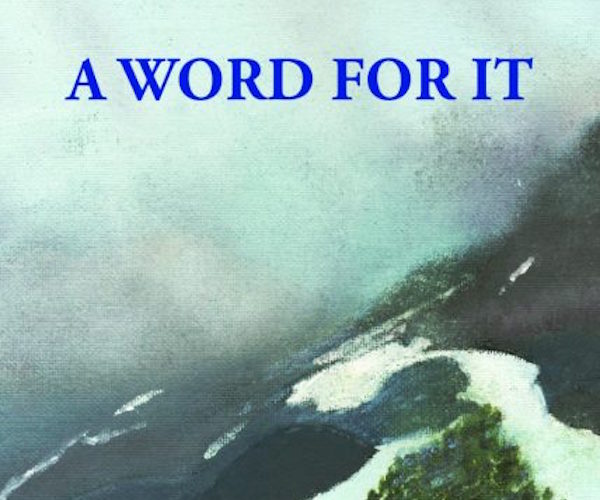Poetry Review: “A Word For It” — Poetry, From out of the Dictionary
Warren Slesinger’s approach to poetry is experimental but skillful as well as entertaining.
A Word For It, by Warren Slesinger. Dos Madres Press, 50 pages, $16.

By Ed Meek
One way to took at poetry is to see it as an attempt at exactness of expression. It finds le mot juste for a thought or emotion. “This is the hour of lead,” writes Emily Dickinson, articulating the feeling that follows a death or a “great pain.” Dylan Thomas, reminiscing about his childhood, observes “Time held me green and dying/ Though I sang in my chains like the sea.” Warren Slesinger treats poetry as a means of defining words and feelings. And he sticks with it. His slim volume has twenty-six poems arranged in alphabetical order (of course). Each poem begins with what sounds like a dictionary definition of a word’s form or function.
in the mineral world when a white hot mass
of silicates, oxides and potash fuses to form
a bright and brittle substance that is clarity
itself: a thin, square, rigid pane of glass
Slesinger goes through four definitions, concluding with an example:
made wholly of glass; hence, its’ contents:
Before he sipped the bubbles of champagne,
he raised his glass: “To Life!”
So, although the poems seem like dictionary definitions, the lines are arranged as a poem with attention to sound and rhythm. At the end of the poem there’s a leap, as Robert Bly would say, to something insightful and often surprising. You may have noticed the apostrophe after the s in the word “its.” There are a number of those in the book along with quite a few other typos: a K missing from Knowledge, an e left off of secrete, an r missing from sandpiper. There should either be a comma or a hyphen between white and hot in the above poem. Proofreading — unless Slesinger intends these mistakes — is going the way of the dodo.
Some of the poems are self-contained and funny, like this one called “Shirt.”
article of clothing with
a buttoned frontal
opening, two sleeves,
a collar and a tail for
tucking into the trousers
thereby covering the
buttocks and the genitals.
2. One’s most prized
possessions. Self-
composure when exposed
to risk or injury: keep
your shirt on.
One’s most prized possessions indeed. One can also find commentary on language in a number of poems. “Letter” begins with “a form of written expression,” then includes a reference to Maupassant, moves onto “love letter” and ends with Letters … Literature in general. B. Learning and/knowledge esp. of literature: ‘In truth, / I prefer a pretty woman to all the arts/and letters.'” The latter is a paraphrase of Maupassant’s comment: “I prefer a pretty woman to all the arts.”
A few poems make political statements: “Vapor” succinctly captures the awful nature of the current state of warfare.
in the air: a mixture of suspended matter
that makes it difficult to see down the street
in Baghdad. 2. A mist with a man in it.Vaporize: (vay.por.ize) v. 1. Only
to convert into a vapor with the heat
of a high explosive. 2. To detonate
a mess of manhood high-strung on hate.
Vaporous (vay.por.us) adj. 1. What
is collecting in a cloud of Middle-Eastern
malice. 2. Rising from a blast of body
parts on the ground.
Many literary magazines today are obsessed with ‘innovative’ hybrid forms that are often just a lazy mash-up of poetry and prose. Slesinger’s approach is experimental but skillful as well as entertaining. Just don’t pay any attention to those typos.
Ed Meek is the author of Spy Pond and What We Love. A collection of his short stories, Luck, came out in May. WBUR’s Cognoscenti featured his poems during poetry month this year.
